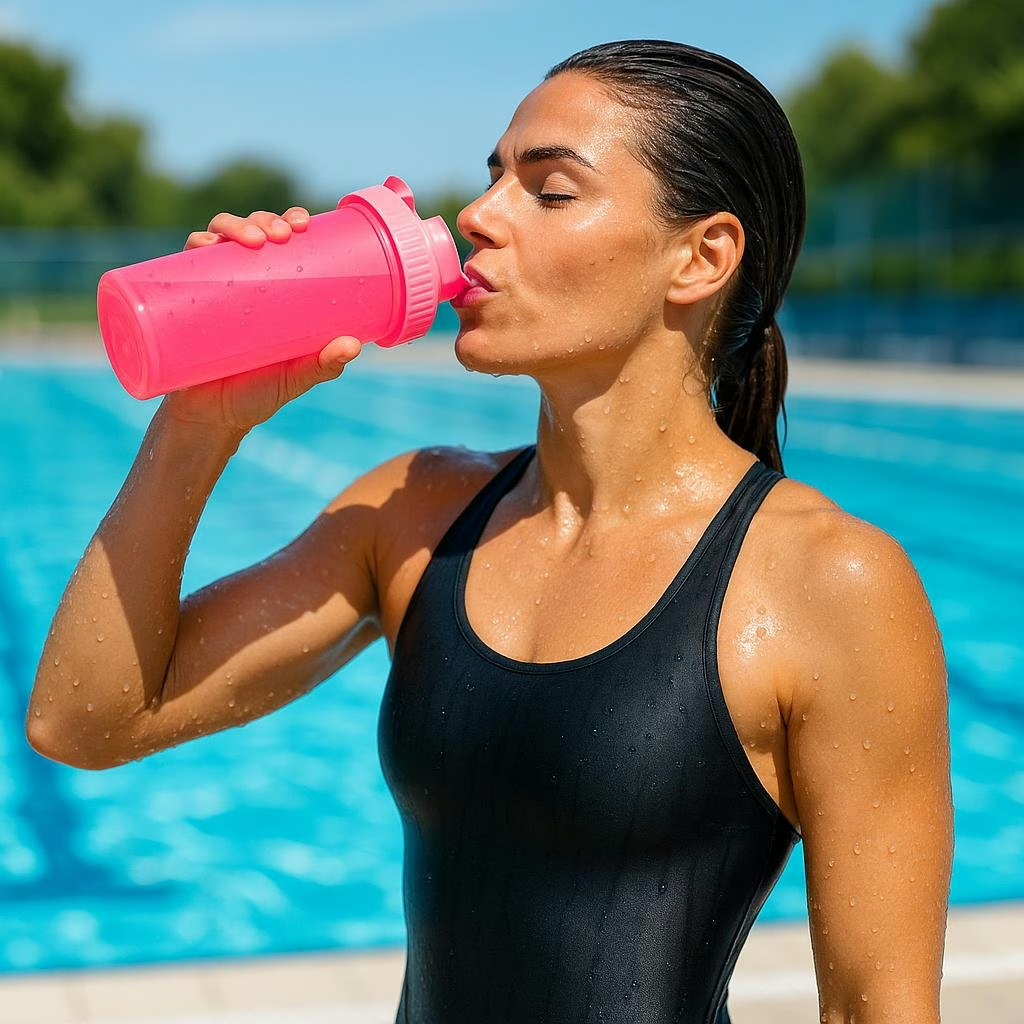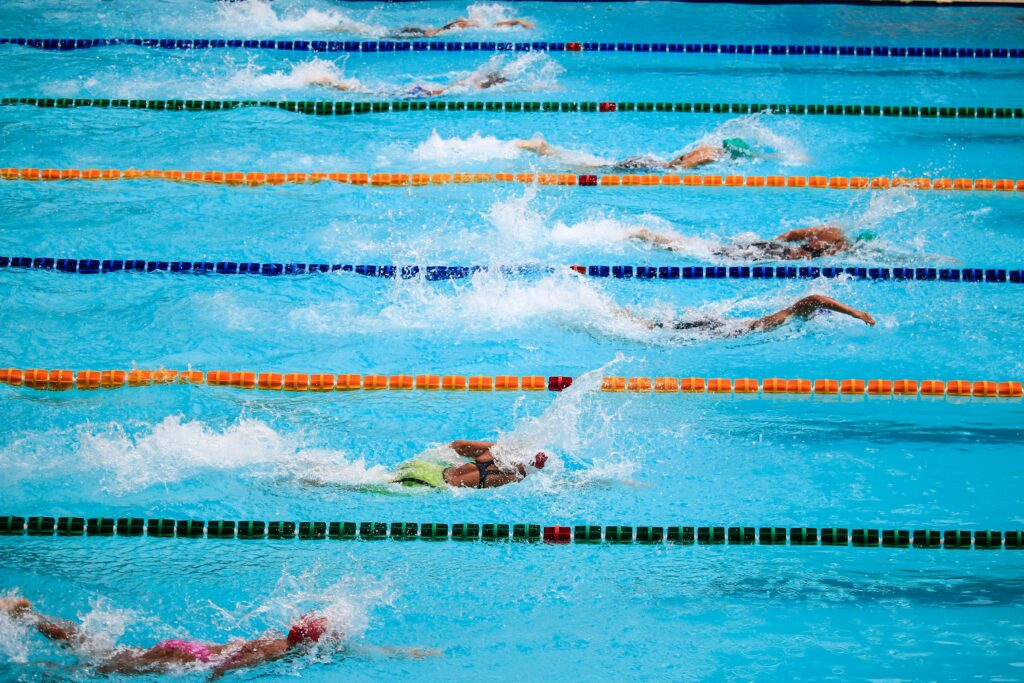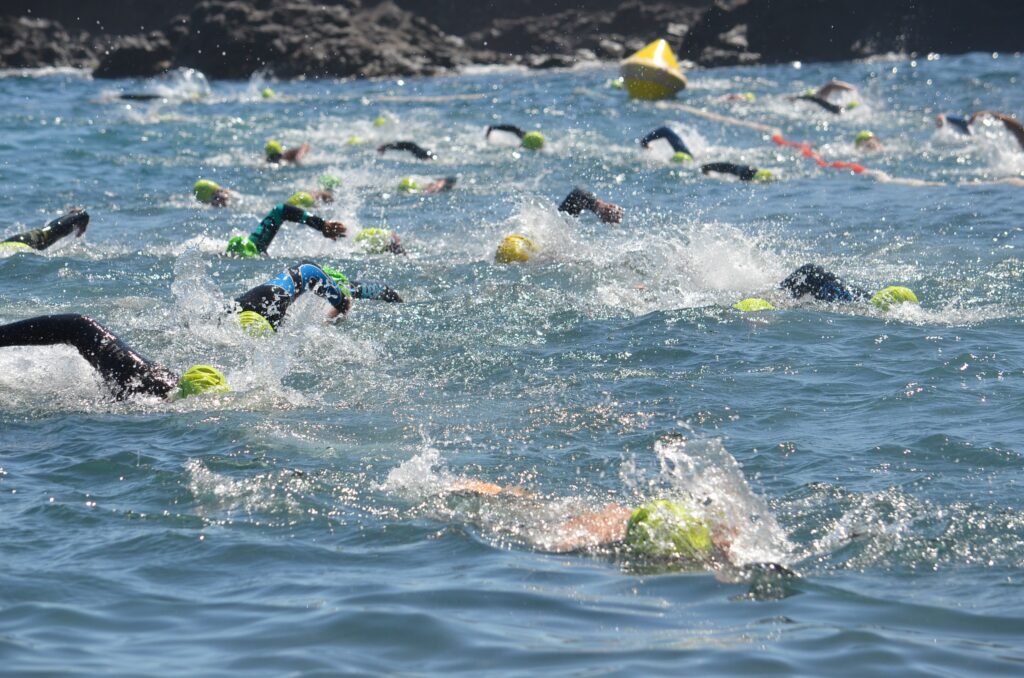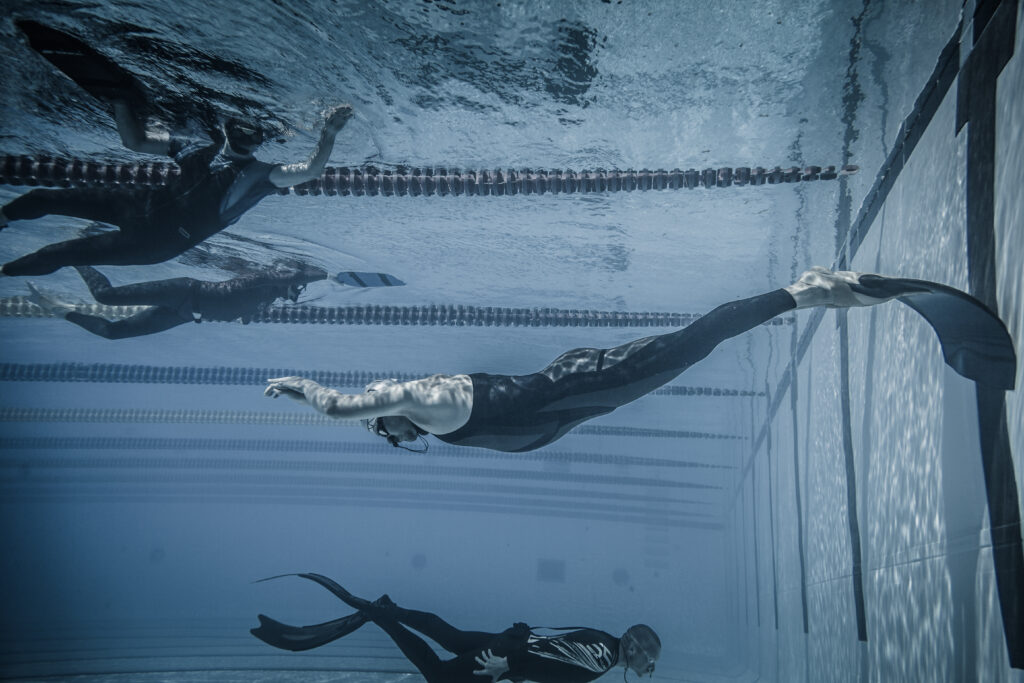Many swimmers wonder if pre-workout supplements can boost their performance in the pool. These supplements promise enhanced focus, energy, and endurance—qualities that could benefit anyone tackling intense swim training. However, taking pre-workout before swimming comes with unique considerations that differ from land-based exercises.
Pre-workout supplements can be beneficial for swimming, but they must be chosen carefully as some ingredients may cause anxiety, jitters or increased heart rate that could affect your performance in the water. Products containing caffeine might provide mental focus, but too much could create uncomfortable side effects during your swim session. It’s important to balance the potential benefits with the possible drawbacks.
For swimmers seeking performance enhancement, alternatives exist beyond traditional pre-workout formulas. Carbohydrate-rich foods have been shown to fuel swimming effectively, as this high-energy sport depletes glycogen stores quickly. Some athletes find that simpler options like a banana with protein or a small serving of instant oats provide adequate energy without the risk of stimulant-related side effects.
Key Takeaways
- Pre-workout supplements may enhance focus and energy for swimming, but can cause uncomfortable side effects like anxiety and jitters in the water.
- Caffeine and other stimulants in pre-workout formulas should be approached with caution as they can increase heart rate during an already cardiovascular-intensive activity.
- Carbohydrate-rich nutrition options often provide sufficient energy for swim training without the potential downsides of concentrated supplement formulas.
Understanding Pre-Workout Supplements
Pre-workout supplements have become increasingly popular among athletes seeking performance enhancement before training sessions. These formulations contain various ingredients designed to increase energy, improve focus and enhance physical capacity during exercise.
What Are Pre-Workout Supplements?
Pre-workout supplements are specialised dietary products taken before exercise to potentially enhance athletic performance. They typically come as powders that are mixed with water, but can also be found in ready-to-drink forms or capsules.
Multi-ingredient pre-workout supplements (MIPS) contain combinations of various compounds designed to boost different aspects of training. These products are specifically formulated to be consumed 15-30 minutes before exercise.
For swimmers, pre-workout supplements may offer benefits like increased energy and endurance during intense pool sessions. However, it’s important to note that these supplements aren’t strictly necessary, as many athletes perform well without them.
Some pre-workouts are marketed specifically for swimmers, claiming to address the unique demands of aquatic training. These may emphasise endurance over raw power compared to supplements designed for weightlifting.
How Pre-Workout Supplements Work
Pre-workout supplements aim to enhance performance through several mechanisms:
- Energy boost – Most contain stimulants that increase alertness and reduce fatigue
- Blood flow enhancement – Some ingredients dilate blood vessels for better oxygen delivery
- Buffer against fatigue – Certain compounds may delay the build-up of lactic acid
The effectiveness of these products varies widely based on their specific formulation and the individual’s response. Research on pre-workout supplements shows inconsistent results regarding their efficacy, despite manufacturer claims.
For swimmers, these supplements might help maintain intensity during high-volume training, though benefits must be weighed against potential side effects like increased heart rate.
Market leading pre-workouts powders and drinks
Applied Nutrition ABE Pre Workout
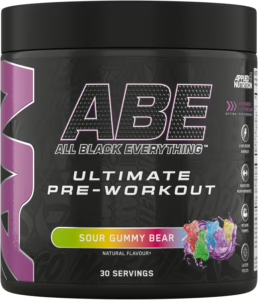
Warrior Rage – Pre-workout Powder
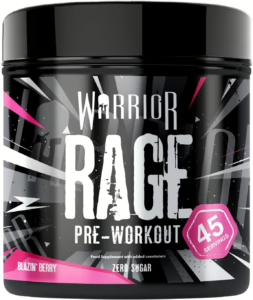
SCI-MX – X-PLODE Pre-Workout
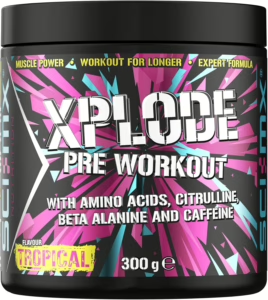
C4 Original Beta Alanine Sports Nutrition Bulk Pre Workout Powder
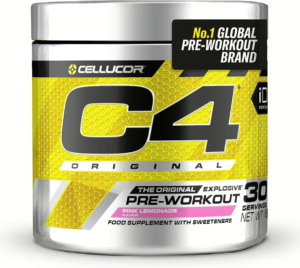
Common Ingredients in Pre-Workout Products
The most frequent components in pre-workout supplements include:
Stimulants
- Caffeine: Enhances alertness and potentially reduces perception of effort
- Theobromine: Milder stimulant often derived from cocoa
Performance Enhancers
- Creatine: Helps regenerate ATP for explosive movements
- Beta-alanine: May buffer acid build-up during high-intensity exercise
- Amino acids (BCAAs, citrulline): Support muscle function and blood flow
Additives
- Sweeteners and flavourings
- Colourants and anti-caking agents
Many products contain proprietary blends that don’t disclose exact amounts of ingredients, making it difficult to assess effectiveness or safety. Swimmers should be particularly cautious of high-stimulant formulas, as these may affect heart rate during prolonged training.
Benefits of Taking Pre-Workout Supplements Before Intense Swim Training
Pre-workout supplements offer several advantages for swimmers during intense training sessions. They contain specific ingredients designed to enhance performance in the water through different physiological mechanisms.
Energy and Endurance Enhancement
Pre-workout supplements typically contain caffeine and other stimulants that provide a significant energy boost before swimming. This energy enhancement allows swimmers to train harder and maintain intensity throughout longer sessions.
Many formulations include beta-alanine and creatine, which help buffer lactic acid build-up in muscles. This buffering effect delays fatigue during high-intensity intervals, allowing swimmers to complete more quality training.
Carbohydrate blends in pre-workouts provide readily available fuel for muscles. This immediate energy source is particularly beneficial for morning training sessions when glycogen stores may be depleted from overnight fasting.
Some swimmers report being able to complete more repetitions or maintain better technique during the latter portions of workouts. This endurance benefit can translate to improved training adaptations over time.
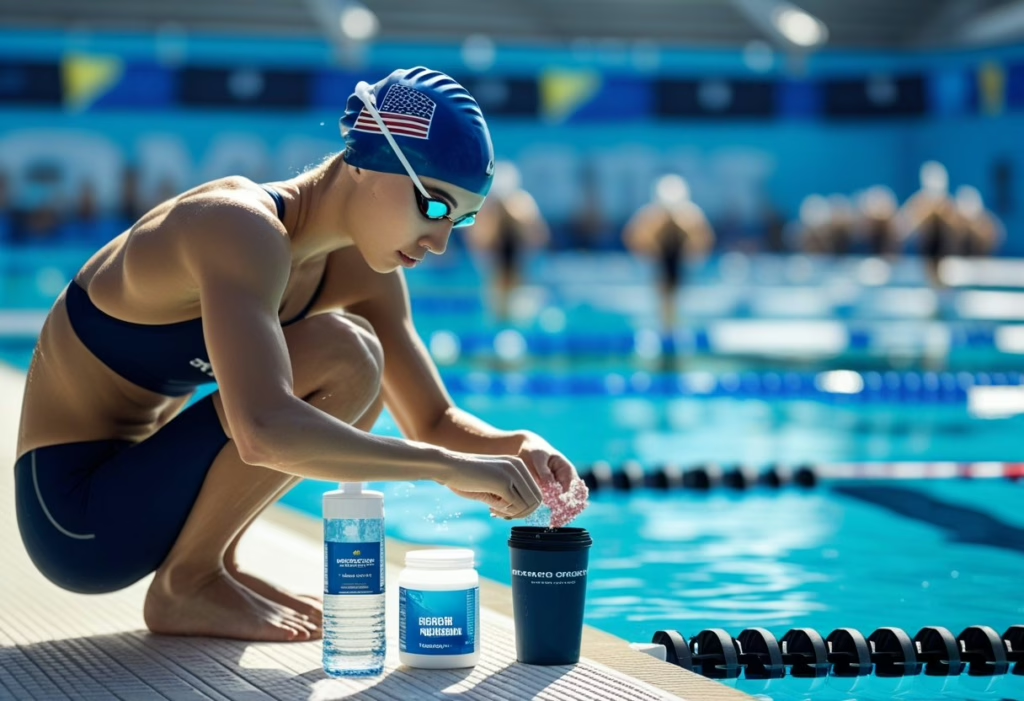
Improved Focus and Stamina
The caffeine in pre-workout supplements enhances mental alertness and concentration. This improved focus helps swimmers maintain proper technique even when fatigue begins to set in during challenging sets.
Ingredients like L-theanine work synergistically with caffeine to promote calm focus without jittery side effects. This balanced mental state is ideal for swimming, which requires both physical exertion and technical precision.
Pre-workouts may help swimmers maintain stamina during those critical training moments when mental fatigue typically causes performance to decline. Better training consistency leads to greater improvements over time.
Tyrosine and other cognitive enhancers in some formulations may improve reaction times. This benefit could be particularly valuable for sprint swimmers working on starts and turns.
Increased Blood Flow and Power Output
Nitric oxide boosters like citrulline and arginine increase blood vessel dilation. This vasodilation enhances oxygen and nutrient delivery to working muscles during swim training.
The improved circulation can help swimmers maintain stroke power throughout training sessions. Many swimmers notice better pull and kick force after taking pre-workout supplements.
Some formulations contain branch chain amino acids (BCAAs) that may reduce muscle damage during intense training. This protective effect could lead to better recovery between training sessions.
Betaine and other power-enhancing ingredients might help swimmers generate more force during explosive movements. This increased power output is particularly beneficial during sprint sets and race-pace training.
Key Ingredients in Pre-Workout Formulas for Swimmers
Pre-workout supplements contain specific ingredients that can enhance swimming performance when taken before intense training sessions. These ingredients work to increase energy, delay fatigue, and improve muscle power during workouts.
Caffeine and Its Effects on Swimming
Caffeine is one of the most effective pre-workout ingredients for swimmers. It works by blocking adenosine receptors in the brain, which helps reduce the sensation of fatigue during intense swimming sessions. Studies have shown that caffeine can help swimmers complete 50m sprints faster and achieve higher peak power.
The recommended caffeine dosage varies by body weight, but most pre-workout formulas contain between 150-300mg per serving. Some swimmers prefer pure caffeine tablets as they allow for more precise dosing.
Timing matters with caffeine intake. For optimal results, swimmers should consume caffeine approximately 30-45 minutes before training to allow proper absorption and peak effectiveness during workout.
Beta-Alanine and Lactic Acid Buffering
Beta-alanine is crucial for swimmers as it helps combat the burning sensation in muscles during high-intensity efforts. This amino acid works by increasing carnosine levels in muscles, which acts as a buffer against lactic acid buildup.
For swimmers who train with high-intensity intervals, beta-alanine can significantly improve performance in the 100-200m range. The typical effective dose in pre-workout supplements ranges from 500mg to 2000mg, though research suggests higher amounts may be more beneficial.
The tingling sensation (paresthesia) some swimmers experience after taking beta-alanine is normal and harmless. This ingredient is particularly valuable for butterfly and freestyle sprinters who frequently encounter lactic acid fatigue during intense training sets.
Creatine and Creatine Monohydrate
Creatine monohydrate is perhaps the most researched supplement for power athletes, including swimmers. It works by increasing phosphocreatine stores in muscles, which helps regenerate ATP—the primary energy currency during short, explosive efforts.
For swimmers, creatine can enhance performance in sprint events and high-intensity training. The typical loading protocol involves taking 20g daily for 5-7 days, followed by a maintenance dose of 3-5g daily.
Contrary to common myths, creatine for swimmers doesn’t necessarily cause water retention that impacts buoyancy negatively. Many elite swimmers incorporate creatine into their supplement regimen, particularly during strength-focused training blocks.
Creatine works best when taken consistently, not just before swimming sessions. It can be particularly beneficial for swimmers focusing on power development and sprint events under 200m.
Nutritional Support for Swim Training
Proper nutrition is crucial for swimmers to perform their best in the water. The right balance of macronutrients, timing of intake, and hydration strategies can significantly impact training quality and recovery.
Carbohydrates and Glycogen Stores
Carbohydrates serve as the primary fuel source during intense swimming sessions. Before training, swimmers should focus on maintaining adequate glycogen stores in their muscles to prevent premature fatigue.
Energy gels containing carbohydrates and electrolytes can be beneficial during longer swim sessions to replenish essential nutrients. These provide quick energy when glycogen stores begin to deplete.
For morning swimmers, consuming instant oats 2-3 hours before training offers slow-releasing energy. This prevents blood sugar crashes during your workout.
Maltodextrin powder mixed into drinks provides a rapidly absorbed carbohydrate source that can be consumed before or during training. This helps maintain energy levels throughout longer sessions without causing stomach discomfort.
Protein Intake and Muscle Recovery
Swimmers require adequate protein to repair muscle damage from training and build new muscle tissue. Aim for 1.4-1.8g of protein per kg of body weight daily, with strategic timing around workouts.
Lean protein sources like chicken, fish, eggs, and dairy provide essential amino acids needed for muscle recovery. Plant-based swimmers can opt for combinations of legumes, tofu, and grains to achieve similar benefits.
Consuming 20-25g of protein within 30 minutes after swimming accelerates recovery and promotes muscle protein synthesis. This timing is crucial for maximising training adaptations.
Liquid protein sources may be more practical immediately after swimming when appetite might be suppressed. Protein shakes can provide a convenient option when whole food isn’t immediately available.
Electrolyte and Hydration Needs
Swimmers lose significant amounts of electrolytes through sweat despite being in water. Proper hydration affects endurance, mental sharpness, and recovery.
Drink 500-600ml of water 2-3 hours before swimming to ensure proper hydration status at the start of training. During longer sessions (over 60 minutes), consider sipping on an electrolyte drink between sets.
Electrolyte powders can be added to water to replace sodium, potassium, magnesium and calcium lost during training. These are particularly important during high-volume training periods or in warmer pool environments.
Sodium bicarbonate supplements, taken at 0.2-0.3g per kg of body weight 60-90 minutes before exercise, can buffer lactic acid buildup during high-intensity swimming, potentially delaying fatigue in middle-distance events.
Potential Side Effects and Considerations
Pre-workout supplements may enhance swim performance, but they come with several notable side effects that swimmers should weigh carefully. The stimulants in these products can affect individuals differently based on their sensitivity and overall health status.
Sensitivity to Stimulants
Many pre-workout supplements contain high levels of caffeine and other stimulants that can cause increased blood pressure during intense swim sessions. For swimmers with existing cardiovascular conditions, this poses significant risks.
Individual tolerance varies greatly. Some swimmers might experience intense jitters, rapid heartbeat or flushing after just a small amount.
Skin reactions including tingling sensations are common, particularly from ingredients like beta-alanine. This can be distracting during technical swim training when focus is crucial.
Hydration status matters significantly. Stimulants can increase dehydration risk, which is already a concern for swimmers who might not notice their sweat production in water.
Sleep Quality and Insomnia
The stimulants in pre-workout supplements can remain active in your system for 3-6 hours or longer, potentially disrupting sleep patterns if taken before evening swim sessions.
Poor sleep quality directly impacts recovery, which is essential for swimmers’ training progression. Without adequate recovery, training adaptations may be compromised.
Many swimmers report difficulty falling asleep after using pre-workout supplements, even when training sessions end hours before bedtime. This can create a problematic cycle where swimmers feel they need more stimulants the next day to overcome fatigue.
Regular disruption to sleep cycles may ultimately lead to decreased swim performance despite the temporary boost from pre-workout supplements.
Anxiety and Other Adverse Reactions
High doses of stimulants can trigger anxiety symptoms in susceptible individuals. This is particularly problematic in competitive swimming where mental composure is crucial.
Multi-ingredient pre-workout supplements have been shown to cause adverse effects in over half of regular users, according to research. These reactions include:
- Heart abnormalities (palpitations)
- Digestive discomfort and nausea
- Headaches and dizziness
- Anxiety and nervousness
For swimmers with existing anxiety conditions, these supplements may exacerbate symptoms. Even those without prior anxiety might experience new onset symptoms during high-pressure competitive situations.
Long-Term Use and Safety
The long-term effects of pre-workout supplements remain insufficiently studied, especially for aquatic athletes with unique training environments.
Regular use may lead to tolerance, requiring higher doses to achieve the same effect. This cycle can increase risk of side effects and dependency.
Some ingredients in pre-workout formulas lack thorough safety research. Swimmers should be particularly cautious about novel or proprietary blends without established safety profiles.
Younger swimmers should exercise extreme caution. Most research on these supplements focuses on adults, not adolescent athletes whose bodies are still developing.
Consulting with sports nutrition professionals who understand the unique demands of swimming is advisable before incorporating these supplements into a regular training regimen.
Comparison with Natural Nutrition Strategies
While pre-workout supplements offer convenience and targeted ingredients, natural nutrition approaches can provide similar benefits without potential side effects. Natural strategies often focus on whole foods that deliver sustained energy and proper hydration essential for swimmers.
Eating Before Swimming
Timing food intake before swimming is crucial for optimal performance. Swimmers should eat a light meal 2-3 hours before training to allow for digestion. This prevents the uncomfortable feeling of food sitting heavily in the stomach while in the water.
Complex carbohydrates like wholegrain toast or porridge provide sustained energy release, unlike the immediate but short-lived boost from many pre-workout supplements. A small amount of protein helps with muscle maintenance during longer sessions.
For early morning swimmers, even a small banana or a slice of toast with honey 30 minutes before training can prevent energy crashes better than relying solely on supplements.
Hydration is equally important. Plain water works well for sessions under an hour, whilst natural electrolyte sources like coconut water might benefit longer training periods.
Balanced Diet for Swimmers
Swimmers require more calories than many other athletes due to the combination of resistance training and thermoregulation demands in water. A natural nutrition approach prioritises nutrient-dense whole foods over processed alternatives.
The ideal swimmer’s diet includes:
- Carbohydrates (55-60%): Wholegrain bread, rice, potatoes, pasta
- Protein (20-25%): Lean meats, fish, eggs, dairy, legumes
- Healthy fats (15-20%): Avocados, nuts, olive oil, fatty fish
Micronutrients are vital too. Iron supports oxygen transport, calcium maintains bone health, and magnesium aids muscle function. These nutrients from food sources are typically better absorbed than synthetic versions in supplements.
Many swimmers find that a well-designed nutrition plan based on whole foods provides consistent energy levels without the peaks and crashes sometimes associated with pre-workout formulas.
Snacks and Alternative Energy Sources
Natural pre-swim snacks can deliver many of the same benefits as commercial pre-workout supplements. They’re often less expensive and free from artificial ingredients that may cause digestive distress.
Effective natural pre-swim snacks:
- Banana with a tablespoon of nut butter (quick carbs + protein)
- Greek yoghurt with berries and honey (protein + natural sugars)
- Smoothie with fruit, oats, and a small amount of protein powder
- Apple slices with a small handful of nuts
Natural caffeine sources like green tea or coffee can provide similar alertness benefits to pre-workout supplements but with additional antioxidants. A small espresso 30-45 minutes before training works well for many swimmers.
Natural alternatives also include beetroot juice, which may improve endurance through nitrate content, and tart cherry juice, which has anti-inflammatory properties that support recovery.
Professional Guidance and Product Selection
Finding safe and effective pre-workout supplements requires expert advice and careful product evaluation. Making informed choices can significantly impact training outcomes while minimising health risks.
Working with a Sports Nutritionist
A qualified sports nutritionist can provide personalised recommendations for pre-workout supplements that align with specific swimming goals. These professionals assess individual needs based on training intensity, body composition, and performance targets.
Sports nutritionists help swimmers time their supplement intake properly, typically 20-30 minutes before training sessions for optimal results. They can identify potential ingredient interactions with medications and existing health conditions.
Many competitive swimmers work with nutritionists to develop comprehensive nutrition plans that incorporate supplements strategically rather than relying on them exclusively. This balanced approach ensures swimmers get nutrients primarily from whole foods whilst using supplements to address specific training demands.
Choosing Quality Supplements
When selecting pre-workout supplements, swimmers should prioritise products with transparent ingredient lists. Look for supplements that clearly state the exact amount of each ingredient rather than hiding behind proprietary blends.
Modern pre-workout formulas often contain beneficial ingredients like:
- Beta-alanine for buffering lactic acid
- L-citrulline for improved blood flow
- Caffeine for increased alertness (typically 150-300mg)
- BCAAs for muscle recovery support
Avoid supplements with excessive artificial colours, flavours, or fillers. These additives provide no performance benefit and may cause digestive discomfort during intensive swim sessions.
Understanding NSF Certified for Sport and Safety Labels
The NSF Certified for Sport label represents the gold standard for supplement safety. This certification ensures products contain exactly what the label claims and are free from banned substances.
Products with this certification undergo rigorous testing to verify they don’t contain harmful contaminants or prohibited substances that could trigger positive doping tests. For competitive swimmers, this certification is particularly important to protect eligibility.
Expert-tested pre-workout supplements often carry additional third-party certifications. These independent verifications confirm potency, purity and safety beyond manufacturer claims.
Swimmers should also check for allergen information and expiration dates before purchase. Proper storage according to label instructions maintains supplement efficacy and prevents degradation of active ingredients.
Conclusion
Pre-workout supplements can offer benefits for swimmers engaged in intense training sessions. Caffeine can delay fatigue and has been shown to help sprint swimmers achieve faster times and higher peak power compared to those taking a placebo.
For endurance, pre-workout supplements may help swimmers push harder during training. They can provide extra energy for faster recovery between swim sets, allowing for more intense and prolonged training sessions.
However, some experts suggest that certain supplements like creatine may have limited benefits for swimmers, especially younger athletes. Some consider pre-workout supplements to be merely an expensive alternative to coffee.
It’s crucial to remember that supplements work best when part of a comprehensive approach. Proper sleep, balanced nutrition and smart training should always take priority before adding supplements to a routine.
For post-workout recovery, protein supplements like whey can be beneficial immediately after training, while casein protein may be more suitable before bedtime due to its slower digestion rate.
Each swimmer should consult with a sports nutritionist or healthcare provider before beginning any supplement regimen to ensure it aligns with their specific needs and training goals.

